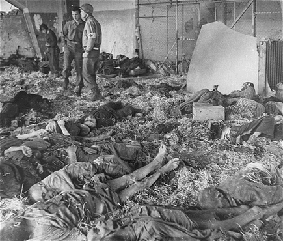
Nordhausen was a sub-camp of the concentration camp Dora-Mittelbau. This camp was created by the SS for prisoners too weak or too ill to work in the tunnels of Dora on the fabrication of the German V1 and V2 rockets. Following the Nazi terminology, Nordhausen was a "Vernichtungslager", an extermination camp for ill prisoners. The extermination methods used by the SS were not the same as the ones used in the great extermination camps: there was no gas chamber but, in Nordhausen, the prisoners died by starvation and total lack of medical care. The conditions of life in Nordhausen were so terrible that the few survivors often said that "If Dora was the hell of Buchenwald, Nordhausen was the hell of Dora"...

Inside a hangar: hundreds of corpses...
The camp of Nordhausen was a huge complex of installations and hangers made of concrete. There were absolutly no sanitary installations and the inmates had to stay in the hangars nights and days, without any food until they died. Even for a man in healthy condition, this could lead very fast to extreme weakness. For prisoners who were already exhausted and ill, these cruel conditions of life meant quick although miserable death.
On April 3th, 1945, Nordhausen was bombed by the US Air Force. Since the camp was installed in concrete buildings and hangars, the US Air Force thought that it was a munitions depot of the German Army. This effective bombing killed a great many of helpless inmates because the SS forced them to stay in the hangars which were set ablaze by the bombs.
Only two survivors found amongst dozen of deads...Nordhausen was liberated by the 104th US Infantry Division on April 12th, 1945. When the first American GI's arrived in the camp, they discovered a gruesome scene. More than 3,000 corpses were scattered, helter-skelter on the grounds. In several hangars there were no survivors and in others they found only 2 or 3 living inmates lying amongst dozen of corpses. The situation was so calamitous that the medic unit of the 104th Infantry Division had to request urgent medical reinforcments and supplies. More that 400 German civilians living in the direct vicinity of the camp were forced by the GI's to evacuate the corpses. The medic units of the 104th Division did the best they could to save as many prisoners as possible but even with the excellent care they received, numerous inmates died in the hours and days following the liberation of the camps.